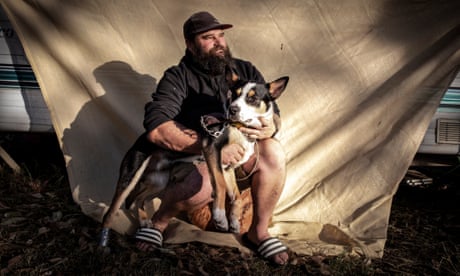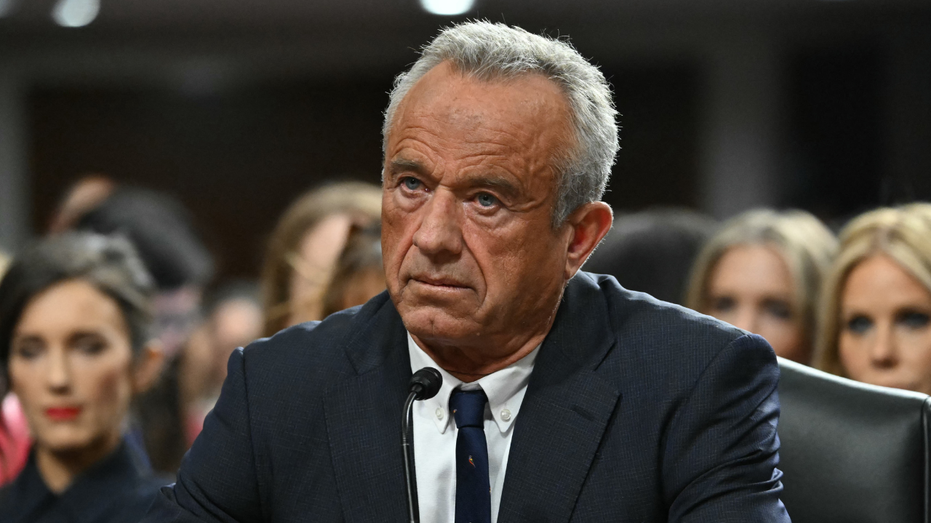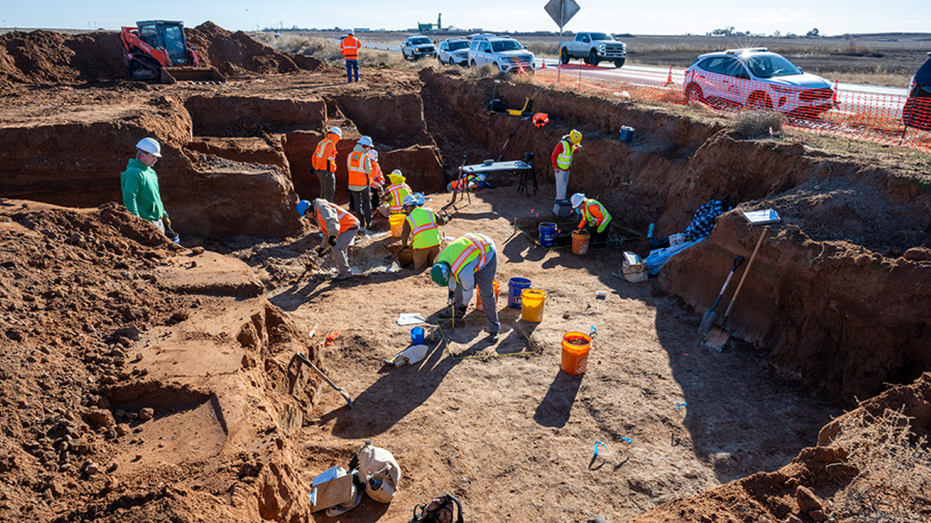- by foxnews
- 24 May 2025
The changing face of homelessness in regional NSW: ‘I’m working, but everything is unaffordable’
The changing face of homelessness in regional NSW: ‘I’m working, but everything is unaffordable’
- by theguardian
- 26 Jun 2022
- in news

In the Moruya North Head campground where around 50 people live, there's no power and the water in the one private shower is cold. "Sometimes you can't handle that, so you've got to boil up some water and try work it that way," says Geoff Pike as the sun dips and the winter chill sets in. Lately, it's been getting down to 3C at night.
Pike moved to the campground, nestled along the south of Moruya's Bengello beach on New South Wales south coast, 10 months ago after his relationship ended with this partner. For the first three months, he made do with a swag and a gazebo, then he sold his motorbike to afford a caravan.
He has a solar panel which, when the sun pokes through the eucalypts that shade the campsite, garners him enough power to charge his phone and to turn the lights on for an hour a day. He has his dog, Archie, as a companion. "It is good being so close to the beach," he says. "My dog loves the water."
Scattered across the campground are tents with kids' toys strewn across the grass; there are caravans, some with tarps wrapped over the top to stop leaks. Some people are content with the off-grid life by the beach, planting vegetable gardens on their lot. There are retirees and families who moved to the campground after their landlords decided to cash in on the housing boom. The mum-of-five living in a tent whose older children chose to stay with friends in town because they didn't want to live at the campground.
But many are living there for the same reason more and more people are moving into campgrounds and caravan parks across the NSW south coast: they can't afford a house in their home town any more.
Daniel Strickland, the area manager of south-eastern NSW for Mission Australia, calls it the "changing face of homelessness", people who could previously afford rent but no longer can because of the shortage of affordable properties.
"We've got many people in that situation where they are working, but just can't get affordable accommodation locally any more," says Strickland.
In two years, the average rent in the south coast, where the average income is $941, has jumped from $450 to $653 a week - an extra $866 a month that people have to find to keep a roof over their heads.
Pike has a full-time contract until the end of this year working as a farm assistant at a local high school. The impermanence of the job means he doesn't know when or if he'll be able to afford a home in the town he's lived in for the past 20 years.
"I've checked out all the rentals and the real estate and everything at the moment for myself is unaffordable," Pike says. "It's hard factoring that in with the cost of fuel and the cost of food too - everything has skyrocketed.
"And you know, it's not only just people who aren't working, I'm working myself. I know some other people out here that are working as well.
"It's not a case of one type of person, it's everybody, so it's getting harder.
"So you know it is more commonplace for people to sort of just go, 'You know what, this is all we can do'."
Of the caravan parks along the south coast that Guardian Australia spoke to, they say they sometimes get multiple calls a day from locals asking if they have a caravan or cabin they can rent.
"I've had people come and beg me to come and stay," says Lyn Carlson, manager of the Garden of Eden caravan park. "I get at least two or three a day ringing me, but I can't put them in here because I've only got 17 cabins."
According to Lachlan Fuzzard, impact coordinator at the Family Place, a homeless support charity in the Eurobodalla region, it's not just people moving into campgrounds and caravan parks. "I spoke to someone from forestry today who called me because they were concerned about seeing people living rough on backtrails, too. So living in cars or tents out of town."
Homeless charities working along the south coast say housing affordability in the region reached crisis point due to three compounding factors.
First came the growing number of rental properties turned into holiday accommodation. In the Bega Valley shire, only 19% of homes are privately rented as non-holiday accommodation compared with 27% for the rest of NSW, according to the council.
Then came the black summer bushfires, which destroyed 501 homes in the Eurobodalla shire and 476 homes in the Bega Valley shire.
The nail in the coffin was the house price boom during the pandemic, and the growing number of people moving from the city to the coast.
"We're seeing a lot of no-fault evictions," says Malindey Sorrell, CEO of Family Place, a homeless support charity in Eurobodalla. "A lot of clients that maybe rented for 20 or 30 years and elderly people who've never had a problem with renting now being evicted because someone wants to cash in on the housing boom and there not being anything else they can afford."
One person Guardian Australia spoke to says after she was evicted from her rental of seven years, the house went back on the market for double the rent. She's now renting a much smaller home that costs 80% of her income.
As Sorrell says: "I think perception is changing of what it is to be homeless or who is homeless."
High school student Ruby*, who lost her family home during the black summer bushfires, has been searching for an affordable rental in her home town with her mum and sister for the past six months. She rotates between living at her grandparents' house, a tent on her burnt-out property, or at one of the local campgrounds. When she needs a shower, she goes to the local pool.
"$450 a week is all we can afford and there's nothing," she says. "The three of us are all on low-income jobs, and on top of that me and my sister are in school, I'm in year 12, so there's only so much we can do."
For many, the solution to find accommodation in caravan parks and campgrounds is seasonal. Come summer, tourists will flock to the region, pushing up the price to stay in holiday accommodation.
Last summer, the Bega Valley shire council made additional land available for short-term camping to accommodate locals during the tourist season.
"That's the best that we've got at the minute," Strickland says. "My faith is there that it would work but it's not ideal.
"It's not ideal to put a family that's escaping domestic and family violence that can't get accommodation and put them in a tent in the middle of the bush somewhere that we get made available to us."
Caroline Long, regional manager of the South East Women & Children's Services, says campgrounds and caravan parks are filling the gap left by a lack of investment in social and community housing, causing issues for the regions most vulnerable.
She says women experiencing domestic and family violence are grappling with an impossible choice: risk becoming homeless or return to their partner. She has noticed more women choosing to return.
Only 3% of housing in the Bega Valley shire is social housing, compared with 5% for the rest of the state. The council says they've lost around 50 social housing dwellings since 2006.
The Bega Valley shire recently launched its affordable housing strategy to help overcome the housing crisis, which Strickland says Mission Australia applauds. The Eurobodalla shire is also planning to undertake consultations to develop their own.
Both councils are calling on the state and federal government to invest more in social and community housing.
"We know that existing stock needs to be maintained and upgraded, and we need at least 150 new social housing dwellings and 100 supported places for those at risk of long-term homelessness," says Emily Harrison, the acting director of community, environment and planning at the Bega Valley Shire council.
Nestled in the Kalaru Holiday Park, a five-minute drive west of Tathra, is the caravan where Richard Lee has lived since February. He's on the waiting list for social housing, and was told that due to his disability, it will be a two-year wait rather than the average 10-year wait.
Lee was living in a unit in Eden with his mum. But after she died, he soon realised there were no rentals he could afford on his disability pension. He now pays $350 a week for the site, which has been discounted from the normal $450 rate.
He's decided rather than wait for social housing, he's going to search for a more affordable region to live in. "It's a shame because I love living in the Bega Valley shire, but it's just unattainable to actually be living in this area any more," he says.
Asked if Pike would consider moving to a cheaper area to afford a home, he says he'll stay. He'd be happy continuing to live at the caravan if he had a better set-up for power and hot water.
"I've lived in this area for more than half my life," he says. "I know a lot of people around here so it's going to be easier for me. I've got a 12-year-old daughter who lives close by."
- by foxnews
- descember 09, 2016
Texas road construction unearths 'colossal' prehistoric remains of 'big ol' animals'
Archaeologists in Texas recently discovered prehistoric megafauna bones, including a giant ground sloth, during a highway project in Lubbock, according to officials.
read more


